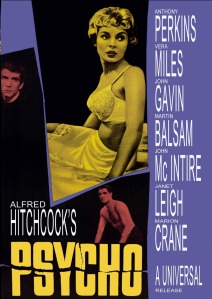I meant to watch Veep this weekend, but instead I watched Hitchcock because it showed up on the screen first.
The movie, as a whole, wasn’t very good, and the lack of respect for factual accuracy made me mad, but something, in particular, made a very strong impression on me. I loved Hitchcock’s resilience and determination in the face of a movie studio that had no interest in supporting him. He believed in Psycho so much that he simply refused to give up. If it meant he had to fund the movie himself, he did. If it meant that he set up a thoroughly unorthodox contract with Paramount, he did. And the best part was near the end (spoiler alert) when Paramount said they would only release the film in a few theaters, and Hitchcock still found a way around it.
My memory is horrible, and the film played fast and loose with the facts, so forgive me if anything I write is inaccurate–but the important part is not my horrible memory. The important part is that, when faced with a situation that could have doomed Hitchcock and the film, he refused to settle. Instead, he came up with an elaborate strategy to make sure that the limited release of the film would be as successful as possible, thus ensuring that Paramount would arrange a wider release. I won’t give away his techniques, because it’s too much fun to watch them play out in the film, but they were genius.
It’s easy, as an artist, to handle a little rejection. That goes with the territory. We expect nothing else. We’re revolutionaries, right? Forging new paths! Breaking down boundaries! But there’s a tipping point. A point at which the rejection feels overwhelming. When we (and when I write we, I really mean me, since I can only speak from my own experience) feel so daunted by the rejection that it seems tempting to give up and get back in bed.
And that’s why I love stories like this one, in Hitchcock, and this one, about the guy who wrote Prisoners. Stores about people for whom it would have been so easy to give up, to admit defeat, and to construct a pleasant narrative we could share with friends over drinks, about how we tried, but the world just wasn’t ready.
But that’s missing the point. Being an artist is precisely about showing the world something new, something the world might not be ready for but so clearly needs, and that’s why sometimes it hurts like hell.
I’ve got a laundry list of rejections. Piles, in fact, both catalogued in my filing cabinet and in my brain. But, if the world isn’t ready, that doesn’t mean giving up. Sometimes it just means trying again, harder, and sometimes, like with Hitchcock, it means finding new ways of doing old things.
It took me five years to find a publisher for Another Kind of Monster. I never found a publisher (or an agent) for Lovergirl, Breathe With Me, or Queen of Hearts. So I simply created my own imprint in collaboration with a creative-development studio, and now the books will be released exactly the way I want.
Giving up is too easy. Don’t give the world the satisfaction.


Recent Comments